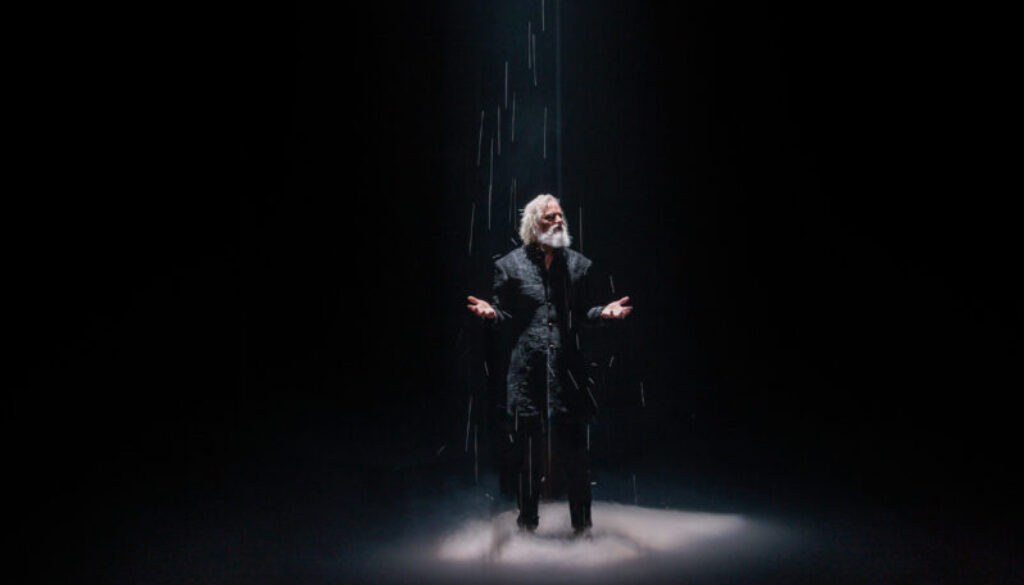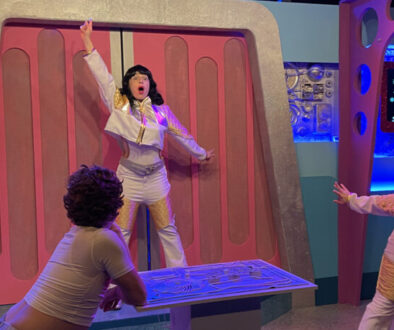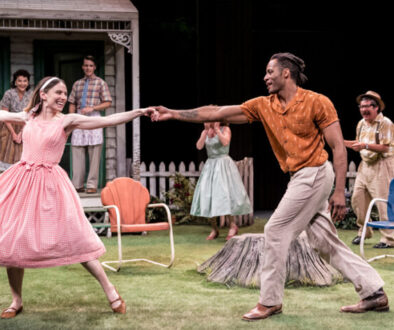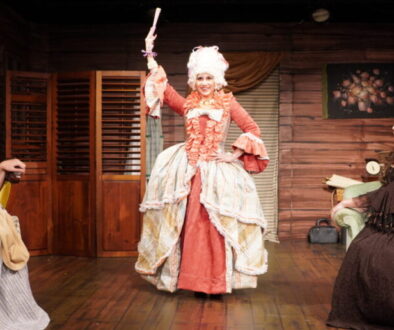By LOU HARRY
A theater festival, a good one, is greater than the sum of its parts – even when its parts are very strong to begin with.

Such is the case with the Stratford Festival, North America’s largest classical repertory theater. Since 1953 it has been presenting Shakespeare and more. This season, 13 full productions hit the boards. I witnessed six.
Well, six plus.
For me, the plus is that extra element – the way works at a multi-play festival can echo, hint at, and comment on each other.
Sometimes, those echoes are obvious. An actor appearing as a lead in one play may show up as a supporting player in another. And it’s difficult not to draw comparisons. Jordan Hall’s lovestruck king in Love’s Labour’s Lost, for instance, takes on a more serious air as Bolingbrook in Richard II, yet both performances make clear each character’s inner conflicts. The new script for Richard II borrows lines from Lear, which you may be more likely to notice if you see them in the opposite order. Hero’s awakening in Much Ado About Nothing echoes Mimi’s revival in Rent – and either may trigger memories of the “not dead yet” number in Monty Python’s ‘Spamalot.’
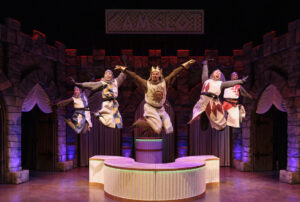
And, okay, when, in Spamalot, not-so-brave Sir Robin’s musicians sing whimsically about Robin having “his eyes gouged out,” I’ll admit I had thoughts of Gloucester’s dire fate in King Lear, which I knew I’d be seeing the following day.
A good festival also affords the spontaneous opportunity for pre- and post-show chats with other attendees on what they are seeing and their thoughts on what they have seen. With over 50 seasons of theater here, don’t be surprised if you run into someone at Stratford who has seen multiple productions of even lesser-known Bard plays.
This season, Much Ado About Nothing proved enormously entertaining while also raising issues of adaptation. Like a number of Shakespeare plays, its pleasures are challenged by a troublesome element in the text – or, in this case, something not in the text. In Much Ado, that’s the quick reconciliation of Hero and Claudio after his humiliation of her at the altar. Yes, he was deceived by the villainous Don John, but the play gives the wronged Hero little voice in response.
Until now.
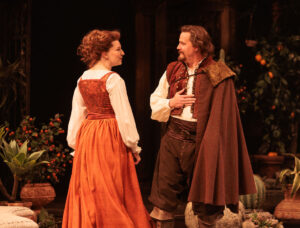
As adapted by playwright Erin Shields, the patriarchy gets a major dressing down via a lengthy speech by Hero. Shields also adds an opening that makes clear that that large circle that hangs above the stage represents a mirror for self-reflection, a wedding ring, and the lady parts that are part of the play’s title (look it up). The message is clear from the onset: The dudes aren’t dominating this production.
Of course, Shields isn’t the first person to give Shakespeare a rewrite. And while newcomers unfamiliar with the original may incorrectly marvel at Shakespeare’s progressive ending and academics may challenge the change, I’ll admit that it did make that problematic ending more comfortable. It helped that Shields’ text felt rhythmically right, fitting comfortably with the original, even if it went on a tad too long.
All would be for nought, though, if what came before it wasn’t packed with pleasures, chief among them Maev Beaty’s formidable and very funny Beatrice. A challenge for any Beatrice is how to make the strong cynic and the self-realized lover one and the same. Whether engaged in Carol Burnett-level physical humor, tossing a barb at her beloved Benedick (Graham Abbey), or leaping into a passionate kiss with him, she creates a singular, complex, always engaging person.
Even more tweaking has been done to Stratford’s Richard II, this rewrite courtesy of Brad Fraser, the playwright known for Unidentified Human Remains and the True Nature of Love and as a producer/writer on the series “Queer as Folk.”
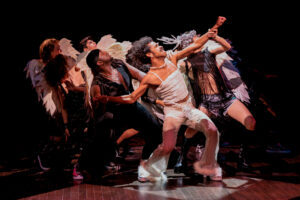
Fraser, director Jillian Keiley and Stratford’s excellent design team certainly bring juice to one of Shakespeare’s less-often-produced history plays. And its boldness bursts from square one, with an extended disco sequence complete with a flock of winged angels – not necessarily heaven-sent. At the center of the revelry is Richard (the personality packed Stephen Jackman-Torkoff) and it would take a trip to the program notes to get that the king’s downfall isn’t at least partly due to his libertine actions. Clearly that’s not the intent, but it’s the impression in this never dull, consistently impressive (love that hot tub), and certainly Stratford-stretching production. I’d love to read the subscribers’ comments that come in for this one. And the supporting cast is full and strong, particularly Michael Spencer-Davis (whose voice I’ll never tire of) as the Duke of York, and Jordan Hall as a Bolingbroke struggling mightily to figure out how to get this kingdom in line with what he sees as normalcy
As I mentioned earlier, Hall plays a very different leader, the King of Navarre, in Stratford’s Love’s Labour’s Lost, but since I saw that one during its preview period, I agreed to refrain from commenting on my favorite Shakespeare comedy. I’ll just say it had my favorite opening moment of any of the plays I caught on this trip.
However, no such restrictions limit me on King Lear, the centerpiece of this year’s fest.
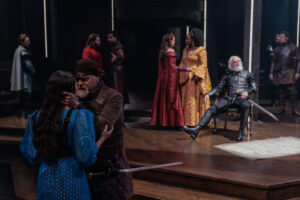
And the centerpiece of this Lear is certainly the actor in the title role. Theater fans may know Paul Gross as the struggling artistic director in the outstanding Canadian television series “Slings and Arrows” (which happens to center on a Canadian theater festival with similarities to this one). If you haven’t seen it, track it down STAT and thank me later.
It isn’t long into the first scene, though, that Gross’ “Slings” character is forgotten and his well-defined Lear takes over. His is a Lear still spry in spite of his gray mane. He masters the arrogance of a man who can’t believe that someone – let alone his beloved daughter – would even suggest that he might be wrong about anything.
This Lear’s kingdom is a dark one. Judith Bowden’s set design and Chris Malkowski’s lighting strongly suggest the dank castle interiors but proves less evocative when the characters venture outdoors – a thrilling rainstorm effect excepted. This kingdom’s not the kind of place to raise your kids and, clearly, Goneril (Shannon Taylor) and Regan (Dejah Dixon-Green) have their issues, enhanced by multi-dimensional performances. I wish I felt more of a connection, though, between Lear and Cordelia (Tara Sky). Here, this special relationship is spoken about but never made manifest, which diminishes the power of the play’s climax.
In strong support, Anthony Santiago gives appropriate gravitas to the Earl of Gloucester, and Michael Blake’s Edmund offers plenty of reason to understand the man while not excusing his villany.
Stratford isn’t just Shakespeare, though. While I didn’t have the time to catch all of the lesser-known and new plays, I did get to the festival’s two musicals, each given a full-out production with terrific sound, sets and lighting. Both proved crowd pleasers, neither straying far from their roots.
While there would seem to be little in common between Rent and Monty Python’s ‘Spamalot,’ they share the fact that both are shows that resist any efforts to add concepts or make discoveries. Rent relies largely on its songstack and the appeal of the actors. Spamalot is a well-oiled joke-delivery system with little room for variance.
And both have fan bases that anticipate every word. Yes, there were some at Spamalot who couldn’t resist saying, “Ni!” And for those who wanted to clomp along, coconut shell halves were available for purchase in the gift shop, along with “No Day But Today” T-shirts.

Alas, while I know it’s been a gateway for many people into musical theater. And it speaks about a generation largely ignored in this form, Rent is still, well, Rent. Centered on its two least interesting characters, it’s a show where the slicker the production, the more its structural and other flaws stand out.
To its credit, this slick production includes charming work from Olivia Sinclair-Brisbane as Joanne, Nestor Lozano Jr. as Angel and Lee Siegel in a deeply felt, beautifully sung performance as Tom Collins. Siegel is one of the few here who conveys that his character has lived the life depicted here rather than just visited Alphabet City accidentally.
But the strong moments are too often interrupted by Roger (Kolton Stewart) who seems to have stepped out of a boy band rehearsal rather than a squalid apartment, and Mark (Robert Markus) who still comes across as the bottom of the student filmmaking class. (Side note: Did anyone tell the show’s original creators that that Bolex 16 mm camera Roger’s constantly using doesn’t record sound? And that film and processing actually costs money? (Just wondering.)
In the case of Spamalot, the Stratfordians haven’t brought any bold choices to the (very, very, very round) table. Instead, they deliver the show, with big, big laughs, sparking dance numbers, and a spirit of goofiness that lit up the theater.
The primary difference between this and the Broadway production is that, unlike Tim Curry’s original Arthur, who seemed to back away from the big dance numbers, this king (Jonathan Goad) knows how to cut a rug.
Another extra element that makes a festival more than just a collection of plays: The anticipation of getting back for another season even before the next season’s specifics are announced. This was my third trip to Stratford and I’m already looking forward to my fourth, fifth, and sixth – and regretting those I missed.
The Stratford Festival continues through Oct. 29, with many past productions available on Stratford@home and BroadwayHD. More information at https://www.stratfordfestival.ca/
Lou Harry, has written for more than 50 publications including The Sondheim Review, Variety, and TheatreWeek and is the author of more than 30 books including Creative Block and The Little Book of Misquotations. He edits Quill, the magazine of the Society of Professional Journalists while also contributing regularly to Indianapolis Monthly and Midwest Film Journal. Follow him @louharry and.or visit LouHarry.com

